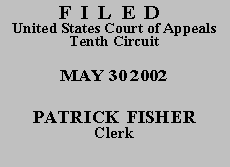

| NASRULLA KHAN,
Plaintiff - Appellant, v. PAULA WHITE; UNITED STATES OF AMERICA, for Federal Tort Claims Act Claim only, Defendants - Appellees. |
|
Plaintiff Nasrulla Khan, proceeding pro se, appeals the district court's order dismissing his lawsuit for failure to state a claim upon which relief can be granted, pursuant to Rule 12(b)(6) of the Federal Rules of Civil Procedure. We exercise jurisdiction under 28 U.S.C. § 1291 and affirm.
Mr. Khan sued defendant White in her capacity as the Director of Federal-State Operations for the Occupational Health and Safety Administration (OSHA). He claimed Ms. White violated his constitutional rights and the agency's statutory mandates by her handling of his questions and claims about a highly toxic cleaner used at his employment several years earlier. At his request, the Utah Occupational Safety and Health Division (UOSH) investigated his charges that the cleaner was toxic and was applied inappropriately. Dissatisfied with the UOSH's response, Mr. Khan turned to OSHA, where he corresponded with Ms. White. In the course of the correspondence, Ms. White informed Mr. Khan that no further action would be taken with regard to his charges. In her letter of October 1, 1998, Ms. White referred to a different, less toxic cleaner than the cleaner named in Mr. Khan's inquiry.
Mr. Khan's complaint alleged that Ms. White's acts and omissions violated his Fifth Amendment rights, subjecting her to liability under Bivens v. Six Unknown Named Agents of Federal Bureau of Narcotics, 403 U.S. 388 (1971). His claims against the United States were brought under the Federal Tort Claims Act (FCA), 28 U.S.C. §§ 1346(b), 2671-2680, and were based on Ms. White's acts and omissions in her correspondence about the toxic cleaner. The district court held that Mr. Khan's complaint failed to state a claim upon which relief can be granted.
On appeal, Mr. Khan challenges the order dismissing his complaint, reasserting his arguments and authorities. In addition, he maintains that the district court failed to consider or evaluate all of Ms. White's actions. He also claims that discovery would have permitted him to learn facts to substantiate some of his claims. Mr. Khan has added the following claims on appeal that were not presented to the district court: he was denied his right of access to the courts, his First Amendment rights were violated, and Ms. White retaliated against him. Finally, he asserts that the district court erred by not allowing him to amend his complaint.
The district court's order to dismiss under Rule 12(b)(6) is reviewed de novo. Stidham v. Peace Officer Standards & Training, 265 F.3d 1144, 1149 (10th Cir. 2001). The complaint's allegations of fact are accepted as true and the complaint is examined to determine if it, standing alone, "is legally sufficient to state a claim for relief." Wyoming v. United States, 279 F.3d 1214, 1222 (10th Cir. 2002). Conclusory allegations are not facts. See Maher v. Durango Metals, Inc., 144 F.3d 1302, 1304 (10th Cir. 1998). Because plaintiff is representing himself on appeal, his pleadings will be liberally construed. Haines v. Kerner, 404 U.S. 519, 520 (1972).
Mr. Khan did not request leave to amend his complaint. Instead, he included in his opposition to dismissal a request for an opportunity to amend "[i]f pro se Plaintiff's Complaint fails to state the claim." R. doc. 35, at 15. He did not suggest how an amendment would cure the deficiencies of his complaint. It is "patently obvious" that Mr. Khan cannot prevail on these facts and that permitting him to amend his complaint would be futile. McKinney v. Okla. Dep't of Human Servs., 925 F.2d 363, 365 (10th Cir. 1991). Therefore, the district court did not err in dismissing the case without allowing Mr. Khan to amend his complaint. See id.
We decline to consider the issues raised for the first time on appeal. Walker v. Mather (In re Walker), 959 F.2d 894, 896 (10th Cir. 1992). We note, however, that Mr. Khan has not alleged facts sufficient to support his new claims alleging denial of access to the courts, First Amendment violations, and retaliation. See Diaz v. Paul J. Kennedy Law Firm, No. 01-2103, 2002 WL 982581, *2 (10th Cir. May 14, 2002) ("While plaintiffs' pro se pleadings are to be construed liberally and held to a less stringent standard than formal pleadings drafted by lawyers, plaintiffs must nonetheless set forth sufficient facts to support their claims.").
We have carefully reviewed the record on appeal, as well as the briefs submitted by the parties. Applying the standards set out above, we affirm the judgment of dismissal for substantially the reasons stated in the district court's well-reasoned memorandum and order entered August 21, 2001.
AFFIRMED. The mandate shall issue forthwith.
Entered for the Court
Circuit Judge
*. This order and judgment is not binding precedent, except under the doctrines of law of the case, res judicata, and collateral estoppel. The court generally disfavors the citation of orders and judgments; nevertheless, an order and judgment may be cited under the terms and conditions of 10th Cir. R. 36.3.